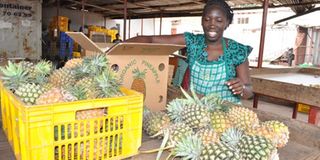URA sued over Shs16b ‘unlawful’ tax refunds

Ms Lillian Anguparu, an exporter of fruits and vegetables preparers pineapples for export. Unprocessed agricultural products, according to the law, are exempted from VAT. FILE PHOTO
What you need to know:
- URA’s response has been dismissive of the claims made by the whistle-blower, insisting that they made their own investigations and insisted that the refunds broke no law.
- The two parties will appear before the commercial court on May 29 for mediation.
Kampala. A whistle-blower has taken Uganda Revenue Authority (URA) to court over what he says were unlawful tax refunds to several exporting companies.
In the case filed on March 21 in the commercial court, Mr Joseph Okuja, through Taslaf Advocates and Consultants, alleges that URA made Shs15.8b worth of Value Added Tax (VAT) refunds to about 20 companies in the coffee, flower, fresh fish and fresh fruits export sectors between 2014 and 2015.
The former URA employee wants the court to declare that such refunds were illegal.
“The plaintiff’s claims against the defendant are declaratory orders that exempt supplies as provided for under section 19 (1) of the Value Added Tax Act (VAT) are not taxable supplies and therefore cannot become taxable supplies at zero rate when exported to warrant a refund of input tax claims,” reads, in part, the plaint that URA received on March 23.
According to Section 19 (1) of the VAT Act, unprocessed foodstuffs, and unprocessed agricultural products are considered exempt supplies. Exempt supplies are not VAT registered and are not entitled to make a claim. The other regime under VAT is taxable supplies that are either charged 18 per cent or zero rated. These qualify for VAT refund.
In a 2010 ruling, which is in part being used by the whistle-blower, Justice Christopher Madrama, noted that exempt supplies were out of scope for VAT purposes. He added that when exported, they do not become zero-rated and therefore qualify a refund. He says URA ignored the internal memo written at the time and the informer disclosure.
“The defendant unfortunately ignored its own internal memo, as well as the informer disclosure report continued to make cash refunds to non-qualified taxpayers and thus causing revenue loss totalling more than Shs15.82b for the period July 2014 to April 2016 alone,” the plaint further reads.
On April 18, 2016, Mr Okuja made a disclosure that is provided for in Section 8 of the Finance Act, revealing to URA that it was losing money due to the tax refunds. “In many cases, the cash refunds are paid out on a fast track basis, that is, cash refunds paid out before an audit of claims is done,” reads the informer disclosure.
In the request to the court, Mr Okuja also wanted all the money recovered, dating as far back as December 21, 2012. He wants URA to assess and recover the money that was unlawfully paid to several exempt companies. The estimates place that at about Shs70b since 2012. On top of that, the defendant says he is entitled to 10 per cent of the recovered amount.
URA hits back
URA’s response has been dismissive of the claims made by the whistle-blower, insisting that they made their own investigations and insisted that the refunds broke no law.
“The defendant subsequently commenced its investigation into the information from the plaintiff and at the closure of the investigations, URA concluded that the information given does not give rise to any tax refundable and the refunds were rightfully derived and payable to the companies in question. That this was based on the defendant’s interpretation that the commodities are zero rated but not exempt,” reads, in part, an official URA document.
Furthermore, URA notes that since there was no amount recovered, the plaintiff was not entitled to the 10 per cent paid to whistle-blowers.
“This is a case where a former employee of URA with a belief that he can make some money as a whistle-blower did indeed avail information, which was investigated by URA and found to be inaccurate and misleading. The results of the investigations were communicated to him,” it goes on to read.
The two parties will appear before the commercial court on May 29 for mediation.
About VAT
Value Added Tax (VAT) is a tax charged on every taxable supply in Uganda made by a taxable person, every import of goods other than an exempt import; and the supply of any imported services by any person. It is charged on every level of the production cycle where a value is added. Uganda’s VAT is 18 per cent. A company qualifies for a refund when it has overpaid the output taxes to the revenue body.



